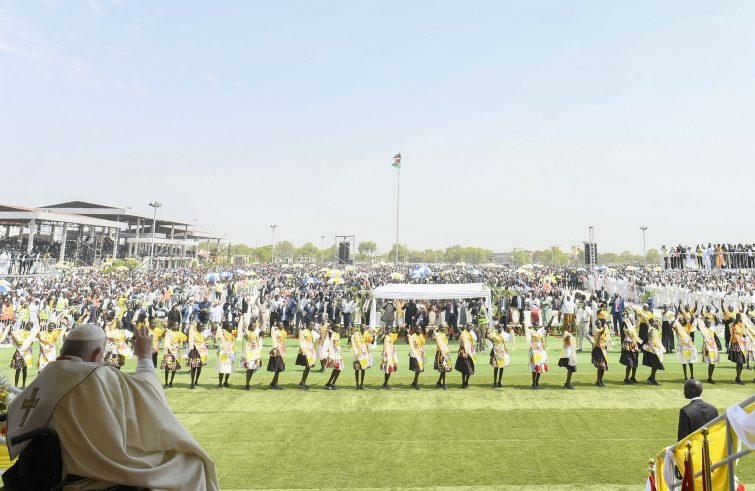
“End all conflict and resume the peace process in a serious way, so that violence can end and people can return to living in dignity.” Pope Francis renewed his “forceful and heartfelt” appeal for peace in South Sudan, as he had done in the Democratic Republic of Congo and in his first address to the authorities. It was echoed in a country battered by civil war and with 5 million internally displaced persons on a population of 14 million. Francis is not alone: he is accompanied at every leg of his ecumenical pilgrimage – marking a first in the history of the Church – by his “brothers”, the Archbishop of Canterbury and Primate of the Anglican Church, Justin Welby, and the Moderator of the General Assembly of the Church of Scotland, Iain Greenshields. In Freedom Hall, a displaced persons camp on the outskirts of Juba, Francis met with a group of people representing some 2,300,000 South Sudanese who have been living there for the past decade. For many of them, the camp is all they have seen, and it was to them in particular that the Pope addressed his remarks. “Only with peace, stability and justice can there be development and social reintegration,” his appeal:
“There is no room for further delay: great numbers of children born in recent years have known only the reality of camps for displaced persons, They have no memory of what it means to have a home; they are losing their connection with their native land, their roots and their traditions.”
“The future cannot lie in refugee camps”, Francis exclaimed: “It is absolutely essential to avoid ostracizing groups and ghettoizing human beings.” “To meet all these challenges, however, there is a need for peace. And for the help of many, indeed of everyone”, the Pope said in the Country “with the greatest enduring refugee crisis on the continent, a humanitarian tragedy that could further worsen in the course of this year.”
“Mothers, women are the key to transforming the country”,
the Pope’s tribute: “If they receive the proper opportunities, through their industriousness and their natural gift of protecting life, they will have the ability to change the face of South Sudan, to give it a peaceful and cohesive development!” From Freedom Hall, Francis renewed the appeal made in the Democratic Republic of Congo during the meeting with the victims of violence in the east of the Country:
“I ask you, I ask all the people of these lands, to ensure that women are protected, respected, valued and honoured. Please, protect, respect, appreciate and honour every woman, every girl, young woman, mother and grandmother. Otherwise, there will be no future.”
The Pope turned his thoughts to women during the Angelus prayer before his departure from South Sudan: “women, especially here, are a sign of hope, and in a special way I thank and bless all the women of the country.” Francis then entrusted the country to Mary, Queen of Peace, to invoke peace in the world and in all countries at war, such as “the martyred Ukraine.”
“Let us help South Sudan; let us not abandon its population. They have suffered and they continue to suffer so greatly!”
was the Pope’s appeal to the whole world from Freedom Hall. “In the name of Jesus and of his Beatitudes, let us lay down the weapons of hatred and revenge, in order to take up those of prayer and charity”, Francis said in his homily for the Holy Mass celebrated at “John Garang” Mausoleum (Juba), before a crowd of over 70 thousand people: “Let us overcome the dislikes and aversions that over time have become chronic and risk pitting tribes and ethnic groups against one another. Let us learn to apply the salt of forgiveness to our wounds; salt burns but it also heals. Even if our hearts bleed for the wrongs we have suffered, let us refuse, once and for all, to repay evil with evil, and we will grow healthy within. Let us accept one another and love one another with sincerity and generosity, as God loves us. Let us cherish the good that we are, and not allow ourselves to be corrupted by evil!
“those who would call themselves Christians must choose which side to take”,
Francis remarked during the ecumenical prayer held in the same site: “Those who choose Christ choose peace, always; those who unleash war and violence betray the Lord and deny his Gospel.” “To raise our voices against the injustice and the abuses of power that oppress and use violence to suit their own ends amid the cloud of conflicts”, the Pope said in his address to the South Sudanese clergy, whom he exhorted to remain close to the people, as Moses did.
“In the name of God, of the God to whom we prayed together in Rome, of the God who is gentle and humble in heart, the God in whom so many people of this beloved country believe, now is the time to say ‘No more of this’, without ‘ifs’ or ‘buts’,
the Pope said in his address to authorities, echoing his appeal in the Democratic Republic of Congo: “No more bloodshed, no more conflicts, no more violence and mutual recriminations about who is responsible for it, no more leaving your people athirst for peace. No more destruction: it is time to build! Leave the time of war behind and let a time of peace dawn!”. “it is not enough simply to be called a Republic; it is necessary to be one.”










